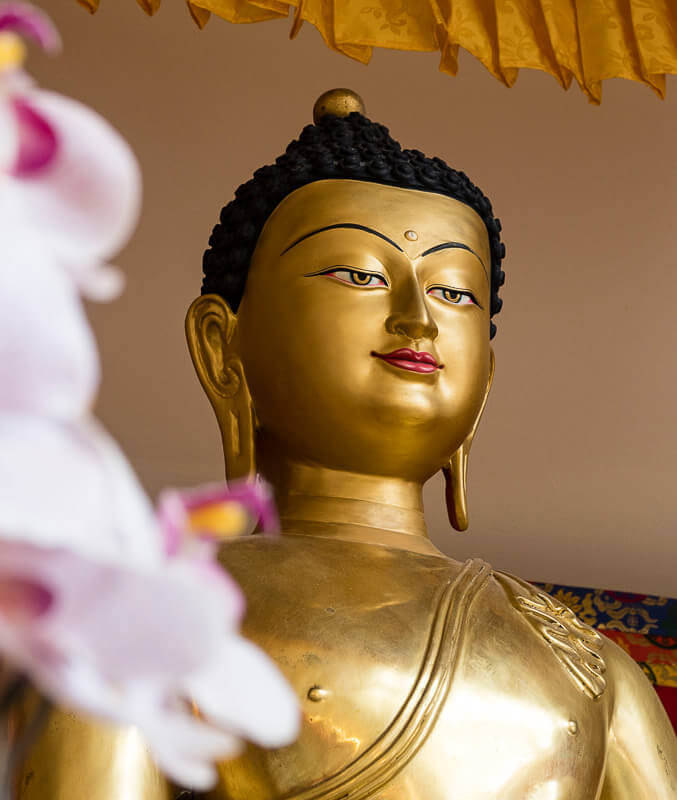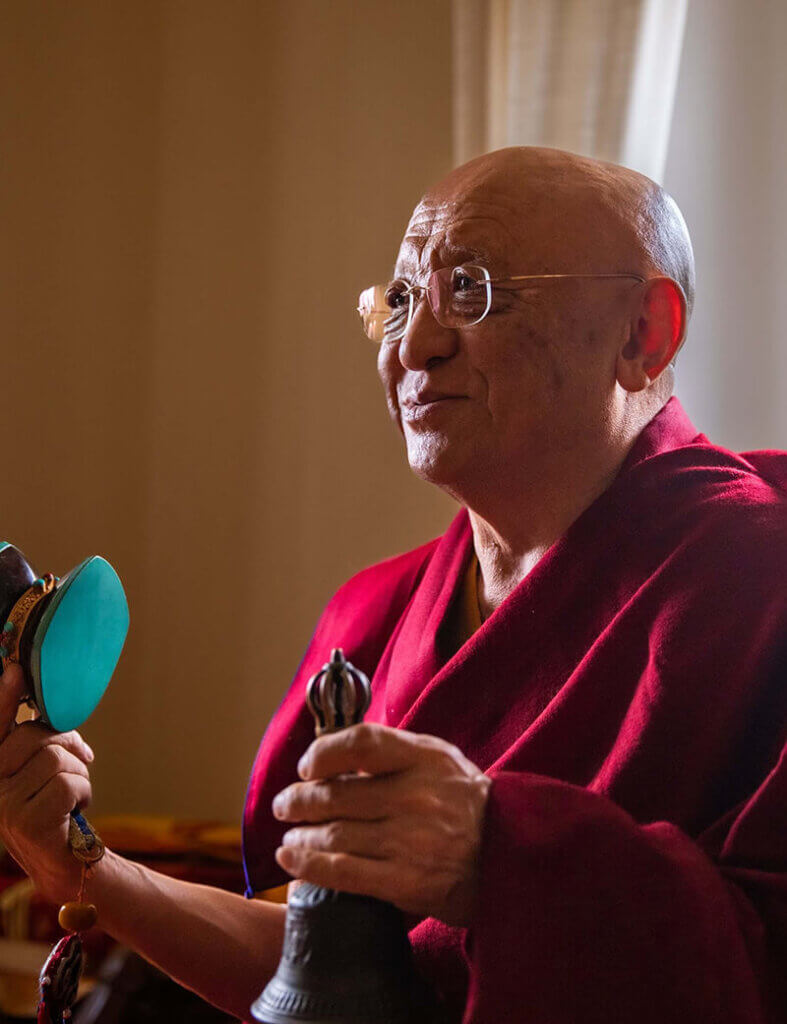The Dharma - The teachings of the Buddha
2500 years ago, Prince Siddhartha Gautama encountered the sufferings of existence, birth, old age, illness and death, and sought a way to end this suffering. He finally realized, after many years of hardship, what is the cause of suffering, that there is a state beyond suffering, and what is the path that leads out of suffering. When Prince Siddhartha fully realized this, he became Buddha Shakyamuni, the Buddha of our time.
The teachings of the Buddha, also called Dharma, are as relevant today as they were then, and more and more people are finding a more fulfilling life with the help of this wisdom teaching.
At Gomde, we are committed to teaching meditation as close as possible to this original teaching of the Buddha, so that it can be applied in all situations of life. At the same time, it is not a prerequisite to be a Buddhist in order to dedicate oneself to “looking inward”.


Meditation
The basis of all good qualities is a balanced, calm mind. Therefore, many seminars are offered at Gomde to familiarize us with mindfulness and inner peace. In doing so, we can let go of everyday stress and get to know our mind from a different perspective – relaxed and open. Through instructions in sitting meditation, walking meditation, and yoga, we learn how to cultivate this inner freedom. Maintaining good inner health also affects physical health and helps with stress management.
Based on a calm mind, various other meditations can be practiced, for example supreme insight, also called vipassana, and meditations on love and compassion.
Kindness and Compassion
One of the practices that our main teacher Chökyi Nyima Rinpoche always emphasizes is mind training, called “lojong” in Tibetan. The aim of mind training is to make our minds softer, kinder and wiser and from this basis to benefit others. At its heart is the understanding of our interconnectedness with all living beings.
Among the different means used for training the mind, one of them is “giving and taking”, also called “ Tonglen”. We train in giving others our good circumstances and happiness, and we take all their suffering and dissatisfaction on ourselves. At Gomde, there are many seminars where we can learn how to apply mind training, which helps us to bring love and compassion into our everyday experience.

"Thought free wakefulness dissolves the grip of our ignorant dualistic mind. Thought free wakefulness blows up the grammar of ordinary consciousness and goes beyond subject, object and action."
- Chökyi Nyima Rinpoche

Vajrayana Buddhism
The principal teachings and meditation techniques taught at Gomde are part of the path of Vajrayana Buddhism. The various Buddhist paths differ in how they go about attaining realization.
Vajrayana is referred to as the “path of the result” because its methods are based on the view that the qualities of enlightenment are not only inherent, but already complete in every living being, they just need to be given the freedom to manifest. With appropriate guidance, the study, contemplation, and application of these teachings can reveal the functioning of the mind and lead us to realizing the true nature of all things: the inseparable unity of compassion and wisdom.
The demonstration of this nature, also called buddha nature, possessed by all sentient beings is a feature of the Dzogchen and Mahamudra teachings which are taught at Gomde by qualified masters. Our mind’s pure nature is not created, but is naturally there. This is what Gomde’s full name, “Rangjung Yeshe Gomde ” points towards: translated literally, it means “place of becoming familiar with naturally arisen wakefulness”.
Another characteristic of the Vajrayana is the variety of methods by which the mind can be quieted, compassion cultivated and knowledge discovered. Ultimately, it is about recognizing every form, every sound, and every movement of the mind as an expression of the mind’s inherently pure nature. A path that uses all facets of one’s life as a path. It is this openness that makes Gomde what it is – a place of diversity.
Therefore, at Gomde there is a wide range of seminars and practices, all held by authorized teachers, who have decades of practical experience in the tradition of our lineage. As a result, the teachings are practiced and passed on in a particularly authentic way.
Nature and Healing
The grounds at Gomde are designed for tranquillity and health; conducive to contemplation and meditation. The house is surrounded by lush gardens and forests. The wind carries beautiful scent of flowers and freshness, and the sound of tickling water. We have created many places to indulge in the healing qualitives of Nature: In our so-called Wisdom garden you can surcumbulate a Stupa (holy object of Meditaiton) while being inspired by a large variety of flowers and plants, beautifully composed to lift your spirits.
The Bodhi Pond, which is a natural pool, with fresh and clean water, provide the perfect place to relax, meditate and even swim in on a warm day.
The Bodhi Path is a tranquil forest walk on our ground with plenty of spots to sit and enjoy nature´s powers. You´ll find many rare kinds of trees and plants in it, carefully uncovered.
We have also done our best to make the most of the natural gifts the land Gomde sits on gives us: our vegetable garden provides our chef with the freshest ingredients for his delicious meals.


Community
Completely run by volunteers- some of whom stay for years, others for a few weeks or days, Gomde is a wonderful example of what can come about when many people, with the good intentions and lots of courage help together.
In Buddhist thought, creating and providing the circumstances for Dharma teachings and practice is thought of as one of the best ways to create goodness for oneself and others.
This goodness is what can be felt by both helpers and visitors alike.
Working together with the motivation to help others also is a great tool to develop social skills, personal development and meditation in action.
A stay here will immediately bring you into a community that helps each other in whatever ways are needed; whether that be work, rest, education, or friendship.
Every visitor and guest has the chance to be part of the community, by helping with a small task such as cleaning or dishwashing during their stay. While the task might be small, the effect is much bigger than the completion of it.